The Unconscious without Freud
Dialog-on-Freud Series
Series Editor: M. Andrew Holowchak
The Dialog-on-Freud series invites authors to explore the history and practice of analytic therapies through critical analysis of and expatiation on the seminal work of Freud. It seeks books that critically scrutinize the numerous facets of Freuds work over the course of his life, that investigate how or to what extent Freuds thinking causally gave rise to the various sorts of therapies that currently exist, and that examine the relevance of Freuds thinking today for those therapies.
Titles in the Series
The Unconscious without Freud, by Rosemarie Sponner Sand
The Unconscious without Freud
Rosemarie Sponner Sand
ROWMAN & LITTLEFIELD
Lanham Boulder New York Toronto Plymouth, UK
Published by Rowman & Littlefield
4501 Forbes Boulevard, Suite 200, Lanham, Maryland 20706
www.rowman.com
10 Thornbury Road, Plymouth PL6 7PP, United Kingdom
Copyright 2014 by Rowman & Littlefield
All rights reserved. No part of this book may be reproduced in any form or by any electronic or mechanical means, including information storage and retrieval systems, without written permission from the publisher, except by a reviewer who may quote passages in a review.
British Library Cataloguing in Publication Information Available
Library of Congress Cataloging-in-Publication Data
Sand, Rosemarie, author.
The unconscious without Freud / Rosemarie Sand.
p. ; cm. -- (Dialog-on-Freud series)
Includes bibliographical references and index.
ISBN 978-1-4422-3173-3 (cloth : alk. paper) -- ISBN 978-1-4422-3174-0 (electronic)
I. Title. II. Series: Dialog-on-Freud series.
[DNLM: 1. Unconscious (Psychology) 2. Freudian Theory. 3. Psychoanalytic Theory. BF 315]
BF173.F85
150.19'52--dc23
2013043265
 TM The paper used in this publication meets the minimum requirements of American National Standard for Information Sciences Permanence of Paper for Printed Library Materials, ANSI/NISO Z39.48-1992.
TM The paper used in this publication meets the minimum requirements of American National Standard for Information Sciences Permanence of Paper for Printed Library Materials, ANSI/NISO Z39.48-1992.
Printed in the United States of America
For my beloved husband, Donn Sand, who made it all possible
Acknowledgements
I owe thanks to three companions in Freud studies whose thoughts, merged with my own, went into the shaping of this book.
Philosopher of science Adolf Grnbaum, whom I met when he left the external world of physics to investigate the internal world of psychoanalysis. The finding that we were of like mind was followed by decades of conversations and unbroken friendship.
Present in spirit was psychoanalyst Emanuel (Manny) Peterfreund, skeptic, ready to challenge any dogma, whose untimely death prevented the completion of what promised to be an important work on the nature of psychological evidence.
In vivid memory, my father, Dr. Robert Sponner, who graduated from the Imperial-Royal School of Medicine in Vienna in 1904. As an eye witness, he told me about the reception of Freud in that city; thus, I learned about the ensuing controversy at an early age.
Preface
What would psychology be like today if Freud had remained a neurologist? If Freud had been granted what, at one time, he wanted most, a research position at the University of Vienna, would we have had a theory of unconscious mindand what would it have been like?
Reading a centurys old journals, I discovered that Freuds German and Austrian contemporaries unanimously credited the fundamental formulation of the concept of unconscious mind to Gottfried Wilhelm Leibniz (16461716)a mathematician physicist, and psychologist, who, according to philosopher Bertrand Russell, was one of the supreme intellects of all time (Russell, 1946, 605). In France, the preeminent psychological researcher, Pierre Janet, agreed on the role then being played by Leibniz. Previously the mind had been equated with consciousness, but today, all of the physical and psychological sciences seem to be taking us back to Leibniz in whose profound philosophy we find an entirely different concept of consciousness (Janet, 1930, 36). This was the theory Freud inherited, the one which he used during the first decade of his career in psychology before he created his own. I suggest that the venerable theory he replaced was better than the one that replaced it. It covered a wider field, was simpler and more plausible and less likely to have provoked an interminable, progress- impeding controversy such as the Freud war.
The first chapter of my book is devoted to Leibnizs stunning contribution to psychology; the second to his psychodynamics. The following four chapters, covering the development and dissemination of Leibnizian theory, are based entirely on previously untranslated eighteenth-century German publications. The first of these describes the popularizing efforts of Leibnizs follower, Christian Wolff, and his creation of a Leibniz-Wolffian psychology. This is followed by a Leibnizians (Johann Georg Sulzers) detailed description of the personal unconscious which reveals the periods deep understanding of the influence that thoughts, feelings and motives outside of awareness can exert on the conscious mind. The succeeding chapter tells of a Leibnizian physicians (Ernst Platners) construction of a model of the brain accommodating conscious and unconscious functioning. The last of these chapters gives a Leibnizians (Ludwig Heinrich Jakobs) set of rules for bringing unconscious mental contents to light, that is, free association.
The seventh chapter introduces concepts about unconscious mental functioning which are surprising because they were offered by Ren Descartes and John Locke, both of whom famously insisted that all thought was conscious. Apparently closely related, these views constitute a theory, totally independent of the Leibnizian, but coexisting with it; although limited, they would nevertheless have been useful.
My initial aim had been to focus solely on the unconscious without Freud, but I found that, practically speaking, this goal had to be modified because certain concepts are so powerfully identified with Freud that mentioning them without him would puzzle readers. This is true, for instance, of the theory of repression. Aspects of Freudian theory are introduced to show how thoughts of the past survived in his work.
Chapter 8, devoted to showing the ubiquity of notions like repression, resistance and the return of the repressed, begins with Plato and carries the subject through Augustine down to modern times. In the following chapter on the Romantic era (chapter 9), we see the concept of the personal unconscious being overshadowed by metaphysical unconscious cosmic forces. It also played a role in the dubious speculative medicine of the time. Schopenhauer, in the next chapter, was also Romantic. However, he fully understood the personal unconscious, and when, after years of neglect, his work became popular in the middle of the nineteenth century, it provided the generations that followed with a lively sense of the power of mental states outside of awareness. In Eduard von Hartmanns internationally popular work, ThePhilosophyoftheUnconscious and the topic of chapter 11, the concept approached a nadir, swamped by metaphysical conceits; the book probably did the concept more harm than good by alienating the scientifically inclined.
The last three chapters, chapters 12 through 14, based on untranslated German sources, deal with what was in Freuds youth, the dominant theory of psychology in his native Austria, the psychology of Johann Friedrich Herbart. Freuds high school study of this psychology, in which all mental activity is produced by the conflict of ideas treated as forces, made a deep impression on the teenage student. Later, it shaped his theory to such an extent that no twentieth-century psychoanalytic patient escaped the influence of Herbart. What had happened was that, lodged in Freuds mind, a pre-Freudian theory took over and determined the shape of a hypothesis that Freud must have assumed was purely his own. Whether Herbarts completely mechanical theory would have had a future without Freud, it is impossible to say.

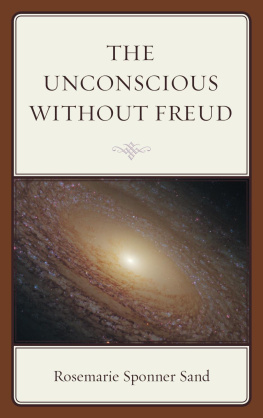

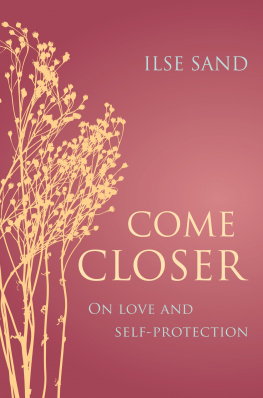

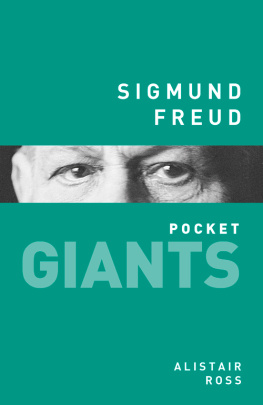
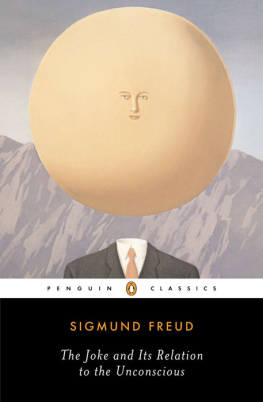
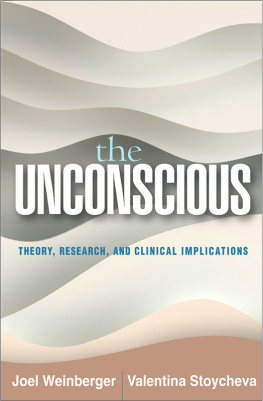
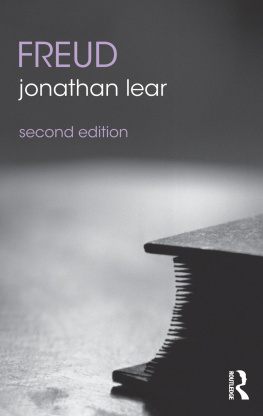
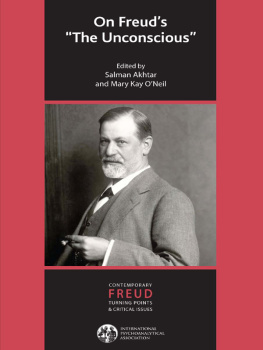
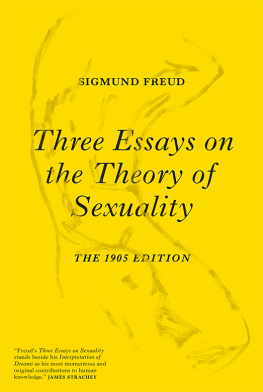
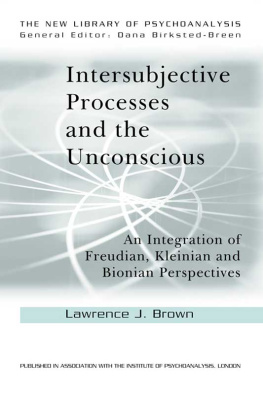

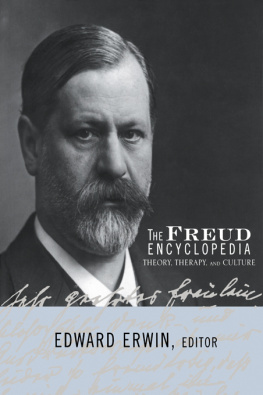
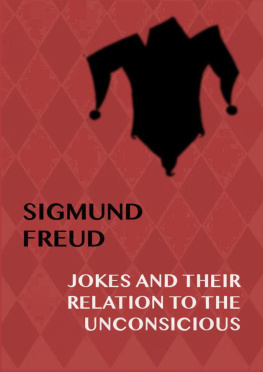
 TM The paper used in this publication meets the minimum requirements of American National Standard for Information Sciences Permanence of Paper for Printed Library Materials, ANSI/NISO Z39.48-1992.
TM The paper used in this publication meets the minimum requirements of American National Standard for Information Sciences Permanence of Paper for Printed Library Materials, ANSI/NISO Z39.48-1992.